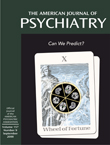To the Editor:
Patients with posttraumatic stress disorder (PTSD) frequently report difficulty falling asleep, decreased sleep duration, and trauma-related nightmares. Effective pharmacotherapeutic treatments for these problems have not been identified. Open-label trials suggest that cyproheptadine may be a promising treatment
(1,
2). Cyproheptadine acts as a histamine 1 (H
1) and serotonin 2 (5-HT
2) receptor antagonist. Evidence indicates that 5-HT
2 antagonists increase stages of slow-wave sleep without altering total sleep time
(3) and improve sleep outcome
(4).
We conducted a double-blind, randomized, placebo-controlled trial of cyproheptadine for treating sleep problems found in PTSD. The participants were male Vietnam veterans who had current combat-related PTSD according to the Clinician Administered PTSD Scale
(5) and who also reported at least moderately severe nightmares on the Pittsburgh Sleep Quality Index
(6). The exclusion criteria included current substance abuse, use of a selective serotonin reuptake inhibitor, mania or hypomania, and any medical condition that contraindicated the use of cyproheptadine. After complete description of the study to subjects, written informed consent was obtained. Sixty-nine subjects were enrolled in this 2-week trial across two sites. Posttreatment data on the Clinician Administered PTSD Scale, the Pittsburgh Sleep Quality Index, and a nightmare questionnaire were available for 60 subjects.
The drug and placebo groups did not differ at pretreatment on severity scores on the Clinician Administered PTSD Scale (F=2.06, df=1, 56, p=0.16), total scores on the Pittsburgh Sleep Quality Index (F≈0.00, df=1, 56, p≈1.00), or nightmare severity (F=2.80, df=1, 56, p=0.10). When adjusted for pretreatment scores by analysis of covariance, posttreatment scores on the Clinician Administered PTSD Scale (F=0.06, df=1, 55, d=0.14, p=0.81) and scores for nightmare severity (F=1.92, df=1, 55, d=0.37, p=0.17) were nonsignificantly higher (worse) in the treatment group than in the placebo group, and scores on the Pittsburgh Sleep Quality Index showed marginally poorer sleep in the treatment group than in the placebo group (F=3.68, df=1, 55, d=0.58, p=0.06). Cyproheptadine serum levels (determined by gas chromatography/mass spectrometry) were available at one site for 14 of 15 treated subjects. Partial correlation analysis, controlling for pretreatment scores, showed a marginally significant correlation of higher cyproheptadine levels with a worsening of Pittsburgh Sleep Quality Index scores (r=0.47, p=0.051) but no significant correlation with scores on the Clinician Administered PTSD Scale (r=0.21, p=0.25) or scores for nightmare severity (r=0.24, p=0.22) (in one-tailed tests).
Contrary to expectation
(1,
2), cyproheptadine does not appear to be an effective treatment for sleep problems or combat-related PTSD and may even exacerbate sleep disturbance. Although the study group was relatively small, low power is an unlikely explanation for our nonsignificant findings because of the trend for poorer sleep in the treatment group and the likely correlation of cyproheptadine levels with worsening of sleep. Our results reinforce the need for skepticism about open-label or anecdotal findings and for careful scientific trials to replicate uncontrolled studies.

